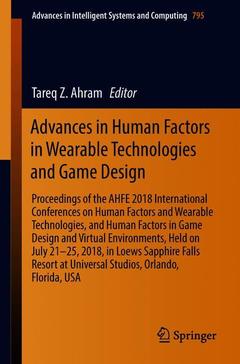Description
Advances in Human Factors in Wearable Technologies and Game Design, 1st ed. 2019
Proceedings of the AHFE 2018 International Conferences on Human Factors and Wearable Technologies, and Human Factors in Game Design and Virtual Environments, Held on July 21-25, 2018, in Loews Sapphire Falls Resort at Universal Studios, Orlando, Florida,
Advances in Intelligent Systems and Computing Series, Vol. 795
Coordinator: Ahram Tareq Z.
Language: English
Subject for Advances in Human Factors in Wearable Technologies and...:
Keywords
Sensors for Emotions Recognition; Acceptance of Support Systems; Support Systems Reducing Physical Stress; Human Activity Recognition; Wearable Devices for Body Posture; Smart Posture Trainers; Wearable Devices for Blind People; Wearable Interfaces; Tactile Communication Systems; Enabling Touch-Based Communication; Wearable Robotic Arm; Ergonomic Design of Smart Devices; Wearable Eye-tracking Glasses; Eye Movement Detection Algorithm; Universal Design for Wearables; Performance of Motion Capture Systems; AHFE 2
Support: Print on demand
Description
/li>Contents
/li>Comment
/li>
This book focuses on the human aspects of wearable technologies and game design, which are often neglected. It shows how user centered practices can optimize wearable experience, thus improving user acceptance, satisfaction and engagement towards novel wearable gadgets. It describes both research and best practices in the applications of human factors and ergonomics to sensors, wearable technologies and game design innovations, as well as results obtained upon integration of the wearability principles identified by various researchers for aesthetics, affordance, comfort, contextual-awareness, customization, ease of use, ergonomy, intuitiveness, obtrusiveness, information overload, privacy, reliability, responsiveness, satisfaction, subtlety, user friendliness and wearability. The book is based on the AHFE 2018 Conference on Human Factors and Wearable Technologies and the AHFE 2018 Conference on Human Factors in Game Design and Virtual Environments , held on July 21?25, 2018 in Orlando, Florida, and addresses professionals, researchers, and students dealing with the human aspects of wearable, smart and/or interactive technologies and game design research.
The virtual penetrating the physical and the implication for augmented reality head-up displays.- Application of wearable technology for the acquisition of learning motivation in an adaptive e-learning platform .- Using non-invasive wearable sensors to estimate perceived fatigue level in manual material handling tasks.- Determination of cognitive assistance functions for manual assembly systems.- Laboratory experiment on visual attention of pedestrians while using twitter and line with a smartphone on a treadmill.- Impressions and congruency of pictures and voices of characters in “The Idolmaster”.- Enhancing usability and user experience of children learning by playing games
Reports on cutting-edge findings regarding the human aspects of wearable devices
Highlights key topics such as user acceptance, satisfaction, and engagement
Focuses on the integration of wearability principles, e.g. aesthetics, affordance, and comfort



